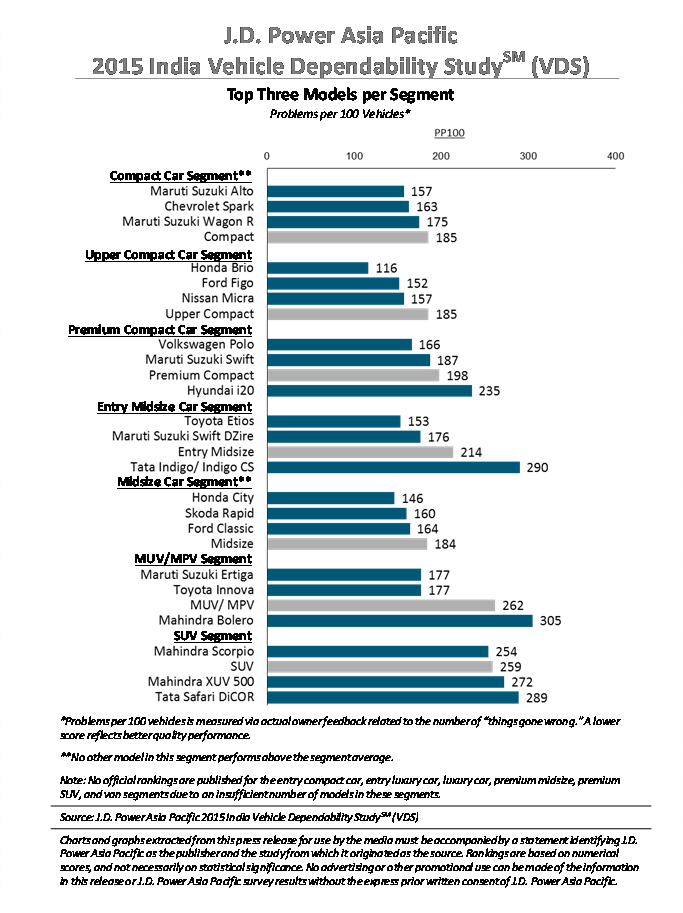New model launches propel improvements in long-term vehicle dependability in India as owners of these models report fewer problems than owners of existing or continuing models, according to the J.D. Power Asia Pacific 2015 India Vehicle Dependability Study (VDS) released today.
The study, now in its eighth year, measures problems experienced by original owners of 30- to 42-month-old vehicles in 169 different problem symptoms across nine vehicle categories: vehicle exterior; driving experience; features, controls and displays (FCD); audio and entertainment; seats; heating, ventilation and air conditioning (HVAC); vehicle interior; engine; and transmission. Overall dependability is based on the number of problems reported per 100 vehicles (PP100), with a lower score reflecting higher long-term vehicle quality.
Overall vehicle dependability in India improved, averaging 206 problems per 100 vehicles (PP100) in 2015, down from 218 PP100 in 2014. Owners of vehicles that were all-new to the market or substantially redesigned at the time they were purchased report 17 PP100 fewer than owners of models that had already been available in the market in previous years. The greatest difference in all-new models is in the vehicle exterior category, with 12 PP100 fewer than current models.
Overall, owners report fewer problems in the engine and vehicle exterior categories. Engine problems decrease by 8 PP100 in 2015, compared with 2014, while vehicle exterior problems decrease by 5 PP100. There is also a significant reduction in the incidence of problems related to excessive fuel consumption (EFC) for both petrol and diesel cars. EFC problems drop to 5.5 PP100 in 2015 from 8.6 PP100 in 2014, contributing to improvements in the engine category. This drop in EFC-related problems is consistent with the continued improvement in fuel economy owners have reported for both petrol and diesel cars over the last five years.
“Improvements in styling, material usage and build quality on models that were newly introduced at the time of purchase are helping enhance perceptions of durability with respect to vehicle exterior,” said Mohit Arora, executive director at J.D. Power Asia Pacific, Singapore. “Additionally, with improved engine technologies that provide better fuel efficiencies, car owners are reporting fewer engine-related problems.”
The incidence of HVAC problems has increased during the past five years to 24 PP100 in 2015 from 18 PP100 in 2011. The study finds a correlation between the HVAC problems reported and the number of passengers riding in a vehicle. In 2015, 67 percent of new-vehicle owners indicate that three or more people ride in their vehicle, up from 50 percent in 2011. When three or more passengers are in the vehicle, HVAC problems average 27 PP100, compared with 20 PP100 when only one or two are in the vehicle.
“As the number of people riding together increases, the number of HVAC problems reported also increases,” said Arora. “With the increase in second- and third-row occupancy, it is imperative for automakers to provide a reliable HVAC unit that optimizes the air-conditioning effectiveness for all the occupants.”
KEY FINDINGS
The 28 percent of owners whose vehicle is under an extended warranty or service contract report fewer problems than those whose vehicle is not under an extended warranty or service contract (192 PP100 vs. 211 PP100, respectively).
- In 2015, 34 percent of owners indicate their vehicle has undergone repairs for unexpected problems, down from 37 percent in 2014. Owners who experience unexpected repairs report a significantly higher number of problems than those who do not (360 PP100 vs. 127 PP100, respectively).
- Among owners who indicate they have not experienced a problem with their vehicle, 74 percent say they “definitely would” recommend their current model to others and 52 percent say they “definitely will” repurchase their current make. In contrast, advocacy declines to 53 percent among those who experience at least one problem with their vehicle and loyalty drops to 37 percent.
2015 India VDS Rankings
The study includes 65 models in 13 vehicle segments: multi-utility/ multi-purpose vehicle (MUV/ MPV); sport-utility vehicle (SUV); premium SUV; van; and car—entry compact; compact; upper compact; premium compact; entry midsize; midsize; premium midsize; entry luxury; and luxury.
Honda, Maruti Suzuki and Toyota each have two models that rank highest in their respective segments. Honda Brio ranks highest in the upper compact segment and the Honda City ranks highest in the midsize segment. Maruti Suzuki Alto ranks highest in the compact car segment, while the Toyota Etios ranks highest in the entry midsize segment. Maruti Suzuki Ertiga and Toyota Innova rank highest in a tie in the MUV/ MPV segment. Volkswagen Polo ranks highest in the premium compact segment and the Mahindra Scorpio ranks highest in the SUV segment.
The 2015 India Vehicle Dependability Study (VDS) is based on evaluations from 8,507 original owners who purchased a new vehicle between July 2011 and September 2012. The study includes 65 models covering 16 nameplates and was fielded from January through April 2015 in 30 cities across India. The VDS is one of two J.D. Power Asia Pacific automotive quality studies for the India market. The 2015 India Initial Quality Study (IQS), which measures problems of new vehicles at 2 to 6 months of ownership, will be published in November.
Chapter 1 – Fuel Type (Petrol vs Diesel) and its impact on Vehicle Dependability in India.
Chapter 2 – Vehicle Type as its impact on Vehicle Dependability. Why do bigger cars have poorer vehicle dependability?
Chapter 3 – Reasons why newer models have better vehicle dependability than existing models.


